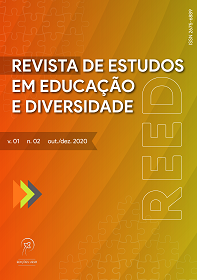BETWEEN DREAMS AND CRISES: SQUADRINIZING THE ACADEMIC IMPACTS OF THE PANDEMIC BY COVID-19 ON THE LIFE OF BRAZILIAN POST-GRADUATES
DOI:
https://doi.org/10.22481/reed.v1i2.7532Keywords:
Coronavirus, Women, Impacts of the pandemic, Graduate students, Gender issuesAbstract
The Covid-19 pandemic has aggravated modern socioeconomic crises and made it possible to glimpse more clearly the antinomies that already existed within capitalist societies. In this hiatus, the challenges faced as a result of the ongoing pandemic crisis are evident in the abrupt changes in modern daily life, produced and felt in different ways, given the changes in the planning of personal, collective and institutional actions. The necessary measures to suspend face-to-face activities and restructure and / or cancel the academic calendar taken by Brazilian universities, in line with national and international health authorities, triggered changes in the lives of masters and doctoral students in the country, a category that despite being commonly seen as privileged has suffered several inequities in recent years. At this conjuncture, we have established to analyze the impacts of the pandemic Covid-19 in the life of stricto sensu graduate students in Brazil. The survey is characterized as a quanti qualitative and the data collection was performed virtually, through SurveyMonkey and received 114 valid responses, 71,93% of which were carried out by women. The age range of the participants varied from 22 to 60 years old, from 17 different Brazilian states. Among the results, as we analyzed the average hours devoted to the activities by the participants before and during the pandemic, we concluded that women already showed an average workload of 13 hours more than men before the pandemic and that the hours devoted to domestic activities during the pandemic increased by an average of 6 hours for them.
Downloads
References
ARAÚJO, Clara; GAMA, Andrea; PICANÇO, Felícia; CANO; Ignácio. (org.). Gênero, família e trabalho no Brasil do século XXI: mudanças e permanências. Rio de Janeiro: Gramma, 2018.
BABBIE, Earl. Métodos de Pesquisa de Survey. Tradução de Guilherme Cezarino. Belo Horizonte: Ed. UFMG, 1999.
BASCHET, Jérôme. COVID-19: O século XXI começa agora. São Paulo: Editora n-1, 2020.
CALAZANS, Roberto; MATOZINHO, Christiane. Pandemia, paranóia e política. São Paulo: Editora n-1, 2020.
CRESWELL, John W. Projeto de pesquisa métodos qualitativo, quantitativo e misto. 3ª ed., Magda F. Lopes, Trad. Porto Alegre: Artmed, 2010.
GONZÁLEZ, Georgina Afonso. ¿Por qué mueren más hombres que mujeres por el covid-19? Por el machismo. Observatorio social del coronavirus: CLACSO, v.1, n. 1, p. 1-3, 2020.
MORETTIN, Luiz Gonzaga. Estatística Básica: Probabilidade e Inferência. São Paulo: Pearson Prentice Hall, 2010.
ORGANIZAÇÃO INTERNACIONAL DO TRABALHO – OIT. COVID-19: Países do G7 devem tornar a igualdade de gênero eficaz para que o futuro das mulheres no trabalho seja melhor. Disponível em: https://www.ilo.org/brasilia/noticias/WCMS_745194/lang--pt/index.htm. Acesso em 15 maio 2020.
SAFATLE, Vladimir. Bem-vindo ao Estado Suicidário. São Paulo: Editora n-1, 2020.
SANTOS, Boaventura de Souza. La cruel pedagogía del virus. 1a ed. Ciudad Autónoma de Buenos Aires: CLACSO, 2020.
SANTOS, Boaventura de Souza. Pela mão de Alice: o social e o político na pós-modernidade. 14. ed. - São Paulo: Cortez, 2013.
SCHMIDT, Flávia; MELLO, Janine; CAVALCANTE, Pedro. Estratégias de coordenação governamental na crise da Covid-19. Brasília - DF: IPEA 2020.
SENHORAS, Eloi Martins. Novo Coronavírus e seus impactos econômicos no mundo. Boletim de conjuntura (BOCA), v. 1, n. 2, p. 39-42, 2020.
SIMAO, Andréa Branco. Entre o ideal e o real: percepções e práticas acerca da divisão de atividades domésticas e de cuidados no Brasil. Rev. bras. estud. popul., São Paulo, v. 36, e0078, 2019. Disponível em: http://www.scielo.br/scielo.php?script=sci_arttext&pid=S0102-30982019000100500&lng=en&nrm=iso. Acesso em: 30 jun. 2020. Epub Sep 16, 2019. https://doi.org/10.20947/s0102-3098a0078.
Downloads
Published
How to Cite
Issue
Section
License
You are free to:
Share - copy and redistribute the material in any medium or format; Adapt - remix, transform, and build from the material for any purpose, even commercially. This license is acceptable for Free Cultural Works. The licensor cannot revoke these freedoms as long as you follow the terms of the license.
Under the following terms:
Attribution - You must appropriately give credit, provide a link to the license, and indicate if any changes have been made. You may do so in any reasonable way, but not in a way that suggests that you or your use is endorsed by the licensor.
There are no additional restrictions - You cannot apply legal terms or technological measures that legally restrict others to make any use permitted by the license.






